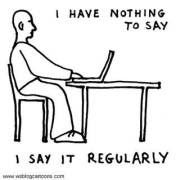12/8/08 Pronouns
Beware of the evil pronouns. Destroy the evil comprehension confusers. Do not say, “it, she, he, they, we, us, etc. in each paragraph without first telling whom you are talking.
Wrong—It belonged to them.
Right—The treasure belonged to the evil pirate crew.
_________________________________________________________________
11/18/08 Predicting is Like Being a Detective
1. Look for clues.
2. Make a guess.
3. Prove it right or wrong.
4. Repeat
_________________________________________________________________
11/17/08 Making Predictions
Effective readers use pictures, titles, headings, and text—as well as personal experiences—to make predictions before they begin to read. They think ahead while reading and anticipate what will happen in the text. After making predictions, they read the text, decide if they were right or not, and revise, making new predictions.
_________________________________________________________________
 _________________________________________________________________
_________________________________________________________________
10/23/08 When Reading Nonfiction What is Important & What is Not
What is Important
1. W's
2. Main Points
3. Ideas that relate to the gist
What is Not
1. Supporting Details
2. Examples
3. Interesting Stories or Opinions
4. Most Adverbs and Adjectives
But remember anything that helps you understand what you are reading is ALWAYS IMPORTANT!
_________________________________________________________________
10/21/08 Reading Rate
The pace of your reading should match your purpose. When reading for information, you must slow down and search for the W's and important details.
_________________________________________________________________
10/10/08 Parts of Speech and Reading
Adverbs
Reading—Cut it out to simplify
Writing—Add to tell how
Adjectives
Reading—Cut it out to make easier to read
Writing—Add to tell what kind
Pronouns
Reading—Change to proper to be more exact
Writing—Change to give the reader variety
_________________________________________________________________
10/9/08 Reading Nonfiction
- Skim
- Read & Highlight
- List W’s
- List facts
- Write a topic sentence/Gist Statement
_________________________________________________________________
10/8/08 Highlighting
- Look closely at the first and last sentence in each paragraph
- HL the W's
- HL only necessary words or phrases
- Don't HL more than ½ of each paragraph
- Don't get thrown off by interesting details or opinions
_________________________________________________________________
10/7/08 Is or Are, Was or Were
Use is/was for one
Use are/were for two or more
Jill is going home.
Jill and Dave are going home.
He was going home.
They were going home.
__________________________________________________________________
10/6/08 Adding a Suffix to a one syllable word with a short vowel
Double the consonant
run—running
wrap—wrapper
pit—pitted
__________________________________________________________________
9/30/08 A & An Use A before a consonant
Use an before a vowel
A car went by.
An apple fell off the tree.
__________________________________________________________________
9/24/08 Reading Aloud to Revise
To revise your content, read an essay aloud. Have the listener alert you at any time when your writing does not make sense, or they have a question. Highlight that part, and after you are finished, go back and rewrite. Then read aloud again. Repeat the process until your essay is easy to understand.
__________________________________________________________________
9/23/08 Spelling when adding ed & ing Double the consonant with a short vowel: slip—slipped
Don't double with a long vowel: pile—piled
Drop the e and add ing write—writing
__________________________________________________________________
09/18/08 Spelling with Y
For plural with a word ending in “Y” change the "y" to "i" and add es.
Cry—cries Carry—carries
_____________________________________________________________________
09/17/08 For More Details, Ask Yourself
1. What kind?
2. Whose?
3. When?
4. Where?
5. Why?
6. How?
_____________________________________________________________________
9/16/08 Thoughts and Feelings in Writing
Teetor-totter
Stuff
∆
Thoughts and Feelings
To write well, thoughts and feelings must carry more weight in your writing.
__________________________________________________________________
9/4/08 Capitalize
1. first word in a sentence
2. proper nouns—names of people, places, and things
3. first letter of words in a title
4. I
_____________________________________________________________________
9/3/08 Letter Writing
1st Paragraph—set the tone
2nd Paragraph—info, facts,
3rd Paragraph—closing, request, message, etc.
_____________________________________________________________________
8/29/08 Writing to a Prompt
When responding to a prompt, you should address the question or topic, and then give facts, reasons, and/or details to support your position or answer.
_____________________________________________________________________
8/28/08 Notes Format
Notes should be dated in the left margin. At the end of the notes, draw a line across the page. The next day, notes go under the line. _____________________________________________________________________
_____________________________________________________________________
 Grades in Reading Workshop are earned based on students' work. Most assignments are graded using a rubric scoring work with 1 - 4. This tanslates into 4=A, 3=B, 2=C, and 1=D. As long as students make an effort to complete their work, they do not recieve an F.
Grades in Reading Workshop are earned based on students' work. Most assignments are graded using a rubric scoring work with 1 - 4. This tanslates into 4=A, 3=B, 2=C, and 1=D. As long as students make an effort to complete their work, they do not recieve an F.











